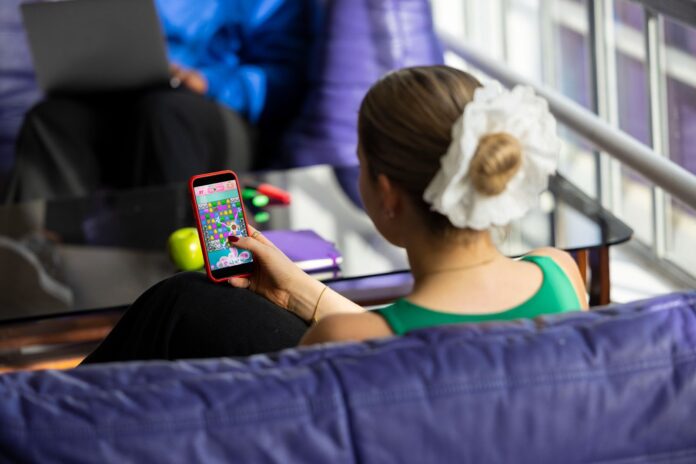Expert reveals why you shouldn’t hide away from taking breaks at work
- Research by Candy Crush Saga® reveals just 37% of UK office workers take regular breaks, and 80% have hidden in places including the kitchen for a secret pause when it all gets too much
- Seven out of 10 Gen Z workers (70%) are scared of what their boss might think if they take a quick break, despite thinking a well-deserved time-out makes them more productive
- A massive 69% of UK office workers play games – such as King’s Candy Crush Saga – on their phone for a quick moment to refocus (34%) or de-stress (30%)
- Career expert Catri Barrett says Millennials, Gen X and Boomers could learn a lot from the younger generation and shares her top tips to crush productivity
Office workers in the UK are in need of a break, according to new research showing that just 37% take regular moments of me-time at work.
And despite the recent ‘lazy girl job’ trend on social media, many of the younger generation are still reluctant to take short breaks, with 70% saying they feel conscious of what their boss might think if they’re seen taking a break outside of their lunch hour.
Brits’ fear is so strong that many admit to taking secret breaks, by hiding in locations such as the bathroom, the kitchen, in a meeting room or outside (80%). Others admitted to hiding in the bin room, the store cupboard and even another company’s office to avoid being seen taking a quick moment to reset.
The nationwide poll was commissioned by Candy Crush Saga to remind hard workers that even a short time away from your desk can boost productivity, particularly as 50% of those surveyed admit that they find it difficult to take breaks, even though they recognise it would help them in the long run.
In fact, taking short breaks – be it grabbing a coffee with a colleague or playing a few levels of Candy Crush Saga – can be beneficial, according to careers expert Catri Barrett, who said our brain’s reward centre is then activated and enables us to return to our to-do list with renewed focus.
As for how people spend their breaks, the vast majority of Brits (69%) said they’d used a quick break to play a mobile game such as Candy Crush Saga – with 89% of the younger generation and 51% of Boomers saying this is their go-to pastime.
The top reasons they gave showed why it could be helpful in your work life: 34% claimed it allows them to focus on something else for a few minutes, 31% said it gives them some me-time, and 30% said it helps them to de-stress.
The poll also revealed some interesting generational differences, with more than a third (36%) of Boomers having already taken a break by 11am, while 20% of Gen Z (born after 1996) say they can’t stand to be seen as ‘offline’ on company communication channels.
That said, Gen Z are more likely to take their full lunch break (81%) than their Gen X (60%) and Boomer (59%) colleagues.
When it comes to that all-important work life balance, it was millennials (72%) who came out top for agreeing they’d got it just right. And for those looking to get their heads down, the survey showed that people feel – on average – our most productive early on a Tuesday morning.
Career expert Catri Barrett said: “There is a common belief and fear among older generations that taking breaks at work can be seen as ‘lazy’ or show a lack of dedication.
“But we cannot sustain peak productivity 100% of the time, and attempting to do so often leads to burnout. Instead, taking well-planned breaks should be seen as an essential part of healthy and sustainable productivity.
She added: “In fact, taking breaks to do things you enjoy is productive. When we participate in leisure activities, our brain’s reward centre is activated, leading to us feeling more engaged and motivated.
“Taking short breaks where you participate in enjoyable activities such as playing Candy Crush Saga for five minutes can boost your overall mood, wellbeing, and energy levels. It’s almost like a ‘mental refresh’ which can facilitate increased motivation and productivity when returning to work tasks.”

Catri’s top five tips for a productive day at the office:
1 – Have another think about how you define productivity
Work on your inner narrative and self-talk around taking breaks. Start seeing them as a positive part of your productivity and workflow instead of something that is hindering your efficiency.
2 – Focus on what’s important
Start each day by prioritising your tasks using the Eisenhower Method. Popularised by former U.S. President Dwight D. Eisenhower, this is a productivity strategy that categorises tasks based on their urgency and importance. It involves dividing tasks into four quadrants: important and urgent, important but not urgent, not important but urgent, and not important and not urgent, helping individuals prioritise and manage their time more effectively.
3 – Schedule regular leisure breaks for a ‘mental refresh’
Take a break at least every 90 minutes and do something you enjoy such as playing Candy Crush Saga. If you struggle to concentrate for long periods of time, set a timer and try to work for a bulk of time, and then break for another bulk of time, depending on what works for your schedule and levels of concentration. .
4 – Time block your tasks
Once you’ve prioritised your tasks, estimate how long they’re going to take you and allocate specific days/times within your schedule. Then add these to your calendar allowing time for breaks, unexpected interruptions and activities.
5 – Only check your emails at certain times
Turn off notifications for your emails and only check them at certain intervals during the day. This way you’re not allowing them to interrupt your flow and focus on other tasks.
Help keep news FREE for our readers
Supporting your local community newspaper/online news outlet is crucial now more than ever. If you believe in independent journalism, then consider making a valuable contribution by making a one-time or monthly donation. We operate in rural areas where providing unbiased news can be challenging. Read More About Supporting The West Wales Chronicle

























